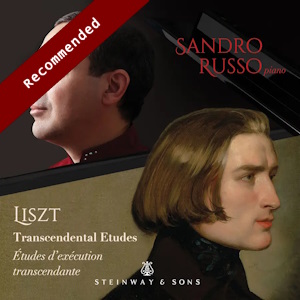
Franz Liszt (1811-1886)
Études d’exécution transcendante S.139 (1852)
Sandro Russo (piano)
rec. 2023, Somo Luminous Studios, Boyce, USA
Steinway & Sons STS30233 [67]
I first heard Sandro Russo play Liszt’s Transcendental Études at the Stoller Hall in Chetham’s School of Music in Manchester. It was a pleasure to listen to such a highly virtuosic and musically satisfying performance of these ferociously difficult works. Russo was in complete technical command throughout, but he seemed to transcend the difficulties, to find the poetry at the heart of each of these works and to offer fresh insights. I subsequently interviewed him and asked him about his approach to this Everest of the piano repertoire. I am delighted to see that he has now recorded the complete set for Steinway & Sons.
Liszt’s Études d’execution transcendante was published in 1852 and is a revision of an earlier set of études published in 1837. As the word ‘Transcendental’ implies, Liszt was more concerned with tailoring his études to the drama and visionary content of each piece, rather than limiting them to a given aspect of technique (as Chopin does in his études). Each of his études becomes a miniature tone poem. Some of the études evoke nature in its idyllic beauty and fierceness (‘Paysage’ and ‘Chasse-neige’); mythological figures (‘Wilde jagd’); legends/heroes (‘Mazeppa’); and ghostly phenomena (‘Feux follets). Others evince harmonic lushness and lyricism such as ‘Ricordanza’ (described by Busoni as “a bundle of faded love letters”) and ‘Harmonies du soir’. The less frequently played ‘Vision’ is believed to represent Napoleon’s funeral procession.
Russo executes the passagework of the opening ‘Preludio’ with brilliance, although I am also struck with the polish and finesse of this performance. He transforms the short work into a tone poem rather than a mere curtain raiser for the set. I am impressed with the range of shifting textures and tone colours he brings to the second A minor étude. He does an excellent job unleashing the Lisztian diabolism in the ascending triplets. There are some lovely tone painting and delicate layering of textures in ‘Paysage’ and a highly expressive handling of the harmonic progressions. Mazeppa is one of Liszt’s barnstorming piano works and it receives a bravura performance here. Russo conveys brilliantly the horse’s hooves described in the Victor Hugo poem on which this piece is based. The cadenzas, octave fusillades and rippling arpeggio figurations are dispatched with brilliance and elan.
‘Feux follets’ is a little slower than some other performers although Russo’s tempo is well judged in my view given Liszt’s Allegretto marking. He brings a shimmering lightness and transparency to the work and a musical sense of line. The darkness and heaviness of ‘Vision’ comes out brilliantly in Russo’s performance. One can hear the dark pageantry of Napoleon’s funeral procession. The ghostly huntsmen riding in the night sky are brought thrillingly to life in the opening section of ‘Wilde Jagd’. Russo does a wonderful job kindling the smouldering passions in the central love song which becomes increasingly heady and rapturous.
The performance of ‘Ricordanza’ is quite simply wonderful. Liszt’s intoxicating melody is surrounded with gossamer arabesques, filigree decorations and enchanting traceries of sound. The increasingly elaborate decorations sound completely natural and unforced, and one cannot but help be swept up in this bewitching love song. The restless agitation of the 10th étude (designated by Busoni as ‘Appasionata’) is beautifully realised, the swirling virtuoso passagework dispatched with ease. Russo summons up a glorious impressionistic sound world in ‘Harmonies du Soir’, the central section becoming increasingly tempestuous and dramatic. The technical command and perfection which is a feature of this recording continues right to the end. ‘Chasse-neige’ is richly atmospheric with the bleakness and ferocity of the snowstorm realised to perfection.
This is outstanding piano playing and a recording of the Transcendental Études which compares with those by the very best performers of the set.
Robert Beattie
Buying this recording via a link below generates revenue for MWI, which helps the site remain free


















